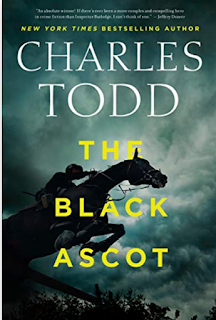Embla Nyström, age 28, is a Detective Inspector in the mobile unit for Gothenburg, Sweden. A fitness fanatic and long-time hunter, she's due for vacation -- and plans to spend it hunting moose with family and friends, a long-time autumn tradition.
The real "beasts" in the book turn out to be human, of course. Embla's slow realization that the hunt has turned murderous involves a poisonous snake planted in the outhouse (live), a vicious leghold trap at the foot of her tree stand, and finally hunters who start dying and disappearing.
Running parallel to the suspense is a powerful attraction Embla feels for a new member of the hunting party, Peter Hansson:
Embla observed him in secret. She knew that he was thirty-eight years old, but he looked younger. Given his athletic build, it was clear that he worked out. And he was tall and good-looking with blue eyes and rather long, thick blond hair. The thin linen shirt he wore was just casual enough. The collar was unbuttoned and she could see a little gold cross at his throat. When he introduced himself a row of white teeth was exposed in a pleasant smile. Bleached? she thought automatically. She also noted the appreciative look she got from him.But this attraction and the hot passions resulting are a dangerous distraction.
Tursten's skilled writing carries the action, which is rapid and increasingly threatening. Her grasp of hunting helps; she's also adept with police procedure, and the interactions in Embla's team become an excellent subplot.
Tursten has always written her female leads with family conflicts and with emotional turmoil that makes perfect sense in the context. This holds up well, although Embla's personality and reactions are a bit softer than found in a true noir. Call this one an intense police procedural, then, with fine pacing and significant losses. And yes, there's an echo of other human-hunting tales ... but considering the context, it works very well to heighten the thrill.
PS: Looking for more mystery reviews, from cozy to very dark? Browse the Kingdom Books mysteries review blog here.





